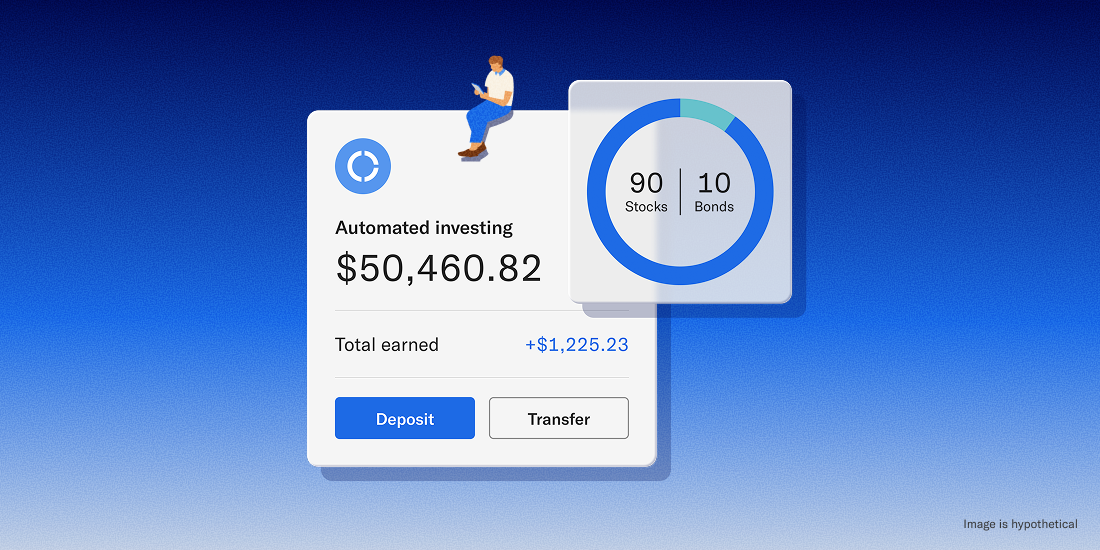Cara Daly
Meet our writer
Cara Daly
Senior Strategy & Operations Manager, Capital Markets
Articles by Cara Daly
-
![]()
How Betterment’s tech helps you manage your money
How Betterment’s tech helps you manage your money Feb 19, 2026 8:30:00 AM Our human experts harness the power of technology to help you reach your financial goals. Here’s how. When you’re trying to make the most of your money and plan for the future, there are some things humans simply can’t do as well as algorithms. The big idea: Here at Betterment, we’re all about automated investing—using technology with human experts at the helm—to manage your money smarter and help you meet your financial goals. How does it work? Robo-advisors use algorithms and automation to optimize your investments faster than a human can. They do the heavy lifting behind the scenes, managing all the data analysis and adapting investment expertise to fit your circumstances. All you need to do is fill in the gaps with details about your financial goals. The result: you spend less time managing your finances and more time enjoying your life, while Betterment focuses on your specific reasons for saving, adjusting your risk based on your timeline and target amount. Plus, robo-advisors cost less to operate. While the specific fees vary from one robo-advisor to the next, they all tend to be a fraction of what it costs to work with a traditional investment manager, which translates to savings for you. Learn more about how much it costs to save, spend and invest with Betterment. A winning combination of human expertise and technology: Automation is what Betterment is known for. But our team of financial experts is our secret sauce. They research, prototype, and implement all the advice and activity that you see in your account. Our algorithms and tools are built on the expertise of traders, quantitative researchers, tax experts, CFP® professionals, behavioral scientists, and more. Four big benefits (just for starters): Less idle cash: We automatically reinvest available dividends, even purchasing fractions of shares on your behalf, so you don’t miss out on potential market returns. A focus on the future: Nobody knows the future. And that makes financial planning tough. Your situation can change at any time but our tools and advice can help you see how various changes could affect your goals. We show you a range of potential outcomes so you can make more informed decisions. Anticipating taxes: We may not be able to predict future tax rates, but we can be pretty sure that certain incomes and account types will be subject to some taxes. This becomes especially relevant in retirement planning, where taxes affect which account types are most valuable to you. Factoring in inflation: We don’t know how inflation will change, but we can reference known historical ranges, as well as targets set by fiscal policy. The most important thing is to factor in some inflation because we know it won’t be zero. We currently assume a 2% inflation rate in our retirement planning advice and in our safe withdrawal advice, which is what the Fed currently targets. Additional advice is always available: At Betterment, we automate what we can and complement our automated advice with access to our financial planning experts through our Premium plan, which offers unlimited calls and emails with our team of CFP® professionals. You can also schedule a call with an advisor to assist with a rollover or help with your initial account setup. Whether you need a one-time consultation or ongoing support, you can always discuss your unique financial situations with one of our licensed financial professionals Managing your money with Betterment: Our mission is to empower you to make the most of your money, so you can live better. Sometimes the best way to do that is with human creativity and critical thought. Sometimes it’s with machine automation and precision. Usually, it takes a healthy dose of both. -
![]()
Three ways it can pay to automate your investing
Three ways it can pay to automate your investing Jan 30, 2026 6:00:00 AM Our managed offering adds value beyond a DIY approach. Here’s how. Key takeaways Portfolio construction is just the beginning. Betterment’s automated investing is designed to help you manage risk, maximize returns, and minimize leg work. Tax-smart features help you keep more of what you earn. Fully-automated Tax Coordination and tax-loss harvesting seek out efficiencies hard to replicate by hand. Navigation helps keep your goals on track. Automated rebalancing, effortless glide paths, and recurring deposits make it easier to stay the course through market ups and downs. Peace of mind is part of the return. Automation frees up time and headspace, letting you live your life instead of worrying about your portfolio. With the arrival of self-directed investing at Betterment, you can choose from thousands of individual stocks and ETFs on your own, including the very same funds we research and select for our curated portfolios. So if you can now buy the same low-cost investments, why pay someone (i.e., us) to manage them for you? It’s a fair question, and to help answer it, it helps to understand why our portfolio construction is just the beginning of the story. It's not just the Betterment portfolio you see today, but the one you see tomorrow (and in the weeks, months, and years that follow) that captures the full value of our expertise and technology. The ongoing optimization and evolution of your portfolio, in other words, is where our automated investing really shines. Sometimes the benefits are tangible. Sometimes they’re emotional. But regardless of how you frame it, we’re constantly working in the background to deliver value in three big ways. Tax savings: keeping more of what you earn Navigation: keeping your investing on-track Calm: keeping your sanity—and your spare time 1. Tax savings: keeping more of what you earn One of the most reliable ways to increase your returns is lowering the taxes owed on your investments. And here's the first way Betterment’s managed portfolios can pay off. Our trading algorithms take tax optimization to a level that’s practically impossible to replicate on your own. Take our Tax Coordination feature, which uses the flexibility of our portfolios to locate assets strategically across Betterment traditional IRAs/401(k)s, Roth IRAs/401(k)s, and taxable accounts. This mathematically-rigorous spin on asset location can help more of your earnings grow tax-free. Then there’s our fully-automated tax-loss harvesting, a feature designed to free up money to invest that would've otherwise gone to Uncle Sam. Our technology regularly scans accounts to identify harvesting opportunities, then goes to work. It’s how we harvested nearly $60 million in losses for customers during the tariff-induced market volatility of Spring 2025. Betterment does not provide tax advice. TLH is not suitable for all investors. Learn more. It’s also a big reason why nearly 70% of customers using our tax-loss harvesting feature had their taxable advisory fee covered by likely tax savings.1 And with the upcoming addition of direct indexing to Betterment’s automated investing, our harvesting capabilities will only continue to grow. 1Based on 2022-2023. Tax Loss Harvesting (TLH) is not suitable for all investors. Consider your personal circumstances before deciding whether to utilize Betterment’s TLH feature. Fee coverage and estimated tax savings based on Betterment internal calculations. See more in disclosures. 2. Navigation: keeping your investing on-track It’s easy to veer off-course when managing your own investing. Life happens, calendars fill up, and the next thing you know, your portfolio starts to drift. When you pay for automated investing, however, you not only get our guidance upfront, you benefit from technology designed to get you to your destination with less effort. As markets ebb and flow, for example, we automatically rebalance your portfolio to maintain your desired risk level. And the “glide path” that automatically lowers your risk as your goal nears? It just happens in eligible portfolios. No research or calendar reminders needed. Our management also helps steer your investing toward a time-tested path to long-term wealth. Most of our portfolios are globally diversified so you take advantage when overseas markets outperform. And we encourage recurring deposits so you buy more shares when prices are low. Recent research by Morningstar helps quantify the value of this “dollar-cost averaging” approach. They found investors lost out on roughly 15% of the returns their funds generated due in large part to jumping in and out of the market. Betterment customers using recurring deposits, meanwhile, earned nearly ~4% higher annual returns.2 It turns out it’s easier to stay the course with a little help. 2Based on Betterment’s internal calculations for the Core portfolio over 5 years. Users in the “auto-deposit on” groups earned an additional 0.6% over the last year and 1.6% annualized over 10 years. See more in disclosures. 3. Calm: Keeping your sanity—and your spare time Our automation can save you time—two hours for each rebalance alone3—but the value of automating your investing is more than just time saved. It’s quality time spent. How much of your finite energy, in other words, are you spending worrying about your money? We can’t erase all of your anxiety, but our team and our tech can empower you to build wealth with confidence and ease, with an emphasis on the ease. 3Based on internal data for a client with one account subject to Betterment’s TaxMin methodology and no other tax features enabled. Betterment will not automatically rebalance a portfolio until it meets or exceeds the required account balance. Between market volatility and a constant barrage of scary headlines, the world is stressful enough right now. There’s little need to add portfolio optimization and upkeep to the list. That is, of course, unless you enjoy it. But many of us don’t. The majority of Betterment customers we surveyed said they hold most of their assets in managed accounts, with self-directed investing serving as a side outlet for exploration. That’s why we offer both ways to invest at Betterment. The payoff is personal Investing performance and price are often measured down to the hundredth of a percentage point. That’s “zero point zero one percent” (0.01%), also known as a “basis point" or "bip" for short. Here at Betterment, it’s our mission to make every one of the 25 bips we most commonly charge worth it. We measure our portfolio’s performance after those fees, so you see what you’ve really earned. And we don’t stop there. With direct indexing and fully paid securities lending coming soon to automated investing, you’ll get even more ways to make your money work harder. -
![]()
How tax loss harvesting turns market losses into tax wins
How tax loss harvesting turns market losses into tax wins Apr 28, 2025 6:00:00 AM The tax strategy can unlock similar benefits as tax-deferred accounts Tax loss harvesting, or TLH for short, is selling an asset at a loss (which can happen especially during market downturns) primarily to offset taxes owed on capital gains or income. It shifts some of the taxes you might owe now, in other words, into the future. But the key takeaway is this: TLH can take a portion of your taxable investing and effectively turn it into tax-deferred investing. And tax-deferred investing, as we’ll quickly demonstrate, can do wonders for wealth-building. Tax me now or tax me later Take a dollar you would’ve otherwise paid in taxes today. Now invest it wisely. Odds are, it’ll be worth a lot more in the long run, even taking away any taxes you eventually owe. Depending on how your tax situation shakes out over the years, tax-deferred investing can be like Uncle Sam giving you a nearly interest-free loan to invest. This is in large part why tax-deferred accounts like traditional 401(k)s and IRAs come with restrictions. They’re reserved for retirement, namely, and their contributions are capped. But tax loss harvesting opens an entirely new door for tax-deferred investing, along with a few other side benefits. For a few types of investors in particular, it offers tremendous upside. Who TLH benefits the most Let’s start with an important caveat: While TLH offers potential value for most investors, it can be a wash or actually increase your tax burden in certain cases. But for now, let’s focus on three types of investors who can reap some of the biggest rewards from the strategy: The high-income earner Once you’ve offset all of your realized capital gains taxes for a given year, any leftover harvested losses can be used to offset taxes on up to $3,000 of ordinary income. So in the case of high earners, this means trading a high income tax rate for a relatively low long-term capital gains tax rate. The end result is both deferring and discounting your taxes. The steady saver Not only are recurring deposits a great way to start a savings habit, they also produce more harvesting opportunities. That’s because the older an investment, the less likely it drops below its initial purchase price (aka “cost basis”) and can be harvested at a loss. A steady drip of deposits, monthly for example, creates fresh crops of investments for harvesting in the near future. The tax-smart philanthropist A common misconception of tax loss harvesting is that it helps you avoid paying taxes altogether. Believe it or not, however, two scenarios exist in which you actually can cancel out your tax obligation: The first is when you donate shares to charity. As we mentioned earlier, selling and replacing shares as part of a harvest increases their future tax bill. It does this by lowering the shares’ cost basis, or the initial purchase price used to calculate capital gains. If you donate and replace these shares down the road, however, you reset their cost basis to a new, higher level. This effectively wipes out their entire tax bill(!) that had accrued to that point. In the eyes of the IRS, it’s like those capital gains never happened, and it’s one big reason why wealthy investors have long paired TLH with the practice of donating shares. The second scenario is posthumously. At that point, you won’t get a tax break, of course. But any individuals who you leave shares to will, because immediately after your death, the cost basis of your investments similarly “steps up” to their current market value. Your harvest awaits Historically-speaking, tax loss harvesting has been too time-intensive and costly to execute for all but the wealthiest of investors. But technology like ours and the low-cost trading of ETFs have made it a tax strategy for the masses. Take the market volatility of 2025 as an example. In little more than two weeks (March 26-April 10), Betterment harvested nearly $60 million in tax losses for customers. If TLH is right for you, the sooner you open and start contributing to a taxable account, the sooner you can start giving a portion of your taxable investing an edge. If you already have a Betterment taxable account, here’s how to turn on tax loss harvesting. -
![]()
How socially responsible investing connects your holdings to your heart
How socially responsible investing connects your holdings to your heart Mar 31, 2025 7:00:00 AM Learn more about this increasingly-popular category of investing. Socially responsible investing (SRI), also known as environmental, social, and governance (ESG) investing, screens for companies that consider both their returns and their responsibility to the wider world. It’s a growing market for investors, with assets totaling $30 trillion as of 2022. We launched our first SRI portfolio back in 2017, and have since expanded to a lineup of three options: Broad Impact Social Impact Climate Impact All three are globally-diversified, low-cost, and built to help align your investing with your values. So let’s explore a few ways they do that, before tackling a common question about the SRI category in general: performance. How our Social Impact portfolio lifts up underserved groups Social Impact uses the Broad Impact portfolio’s foundation while adding a trio of funds focused on helping underserved groups get on equal footing. There’s $SHE and $JUST, which screen for U.S. companies demonstrating a commitment toward gender and social equality, respectively. Then there’s $VETZ, our latest addition to the portfolio. $VETZ is the first of its kind: a publicly-traded ETF that mainly invests in loans to active and retired U.S. service members, and the survivors of fallen veterans. These types of home and small-business loans have historically helped diversify portfolios, and they also help lower borrowing costs for veterans and their families. And unlike $SHE and $JUST, which are comprised of stocks, $VETZ is an all-bond fund. So even if you have a lower appetite for risk when investing, your SRI portfolio can maintain an exposure to socially responsible ETFs. How the $VOTE fund is shaking up shareholder activism Remember the “G” in ESG? It stands for governance, or how companies go about their business. Do they open up their books when necessary? Is their leadership diverse? Are they accountable to shareholders? On that last front, there’s the $VOTE ETF found in each one of our SRI portfolios. On the surface, it seems like a garden variety index fund tracking the S&P 500. Behind the scenes, however, it’s working to push companies toward positive environmental and social practices. It does this by way of “proxy” voting, or voting on behalf of the people who buy into the fund. Engine No. 1, the investment firm that manages $VOTE, puts these proxy votes to use during companies’ annual shareholder meetings, where individual shareholders, or the funds that represent them, vote on decisions like board members and corporate goals. In 2021, Engine No. 1 stunned the corporate world by persuading a majority of ExxonMobile shareholders to vote for three new board members in the name of lowering the company’s carbon footprint. And it did all this in spite of holding just .02% of the company’s shares itself. Not a bad return on investment, huh? Does SRI sacrifice gains in the name of good? We now stand eye-to-eye with the elephant in the room: performance. Worrying about returns is common regardless of your portfolio, so it’s only natural to question how socially responsible investing in general stacks up against the alternatives. Well, the evidence points to SRI comparing quite well. According to a survey of 1,141 peer-reviewed papers and other similar meta-reviews: The performance of SRI funds has “on average been indistinguishable from conventional investing.” And while the researchers note that it’s “likely that these propositions will evolve,” they also found evidence that SRI funds may offer “downside” protection in times of social or economic crisis such as pandemics. Your socially responsible investing, in other words, is anything but a charity case. Simplifying the socially responsible space Not long ago, SRI was barely a blip on the radar of everyday investors. If you were hip to it, you likely had just two options: DIY the research and purchase of individual SRI stocks Pay a premium to buy into one of the few funds out there at the time Those days are thankfully in the past, because our portfolios make it easy to express your values through your investing. And our team of investing experts regularly seeks out new funds like $VETZ and updated SRI standards that strive to deliver more impact while helping you reach your goals. Check out our full methodology if you’re hungry for more details. And if you’re ready to invest for a better world, we’ve got you covered.




